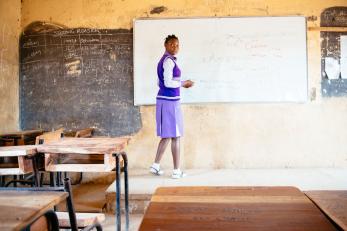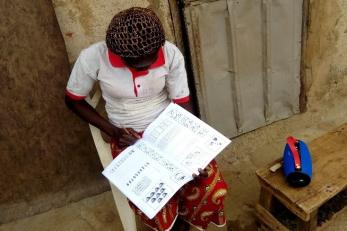Sustaining learning through radio programme amidst COVID-19

The onset of COVID-19 brought with it exceptional challenges to the normal way of doing things, with safety guidelines preventing close contact alongside other people. This has had a great impact on education, resulting in schools and learning centres having to close. In light of this, all ENGINE II learning centres which provided learnings for about 18,000 girls across Kano, Kaduna, Lagos, and the FCT had to close in line with national directives.
One of the key focus' of the ENGINE program is to improve the learning experience of marginalized girls and ensure they complete at least their secondary school education in order to give them a better chance at life. To protect these gains made in the project so far, the program has had to adapt their approach making certain that these girls continue to receive their much-needed learnings. In collaboration with the National Mass Education Commission (NMEC), the ENGINE II FCT team embraced an adaptive measure to connect with out-of-school learners through a Literacy by Radio Programme. The initiative is supporting learnings in English, Mathematics, and Life Skills using the radio recordings developed by NMEC.

NMEC donated 500 copies of primers (a workbook) to ENGINE II learners, which they use for the learning activity. This workbook contains step-by-step instructions that guide the students through topics taught for the day. To assure that they continue to learn on their own, every radio programme ends with homework that the girls are expected to do using their primers. This support provided by NMEC is tantamount to learnings from the ENGINE program on the importance of government agencies in sustaining education interventions.
To arrange adherence to physical distancing; each community has a submission point, the community Chief's palace, where the girls drop their workbook, which is picked up by their facilitators for marking before the next radio programme.
Rahina Adama echoes how relieved many of the girls are, knowing that they can continue learning despite restrictions from the lockdown."There was no way I would have been able to learn anything this period because no one in my house has a smartphone I can use for online classes,” she says, thanking ENGINE for providing this opportunity through radio.
While some see it as an activity they can use to bond with other family members. "It has not just been helpful to me but to my family as a whole, myself and my children sit to listen to the radio and learn together, and it is fun to learn together as a family,” says Fatima Ahmed.
About ENGINE II Program
Educating Nigerian Girls in New Enterprises (ENGINE) II is a three and half year (April 2017 – September 2020) Adolescent Girls’ Education Programme funded by the UK Department for International Development (DFID) through its Girls’ Education Challenge (GEC) Fund. Mercy Corps leads the implementation of ENGINE II in Nigeria, along with Society for Women Development and Empowerment of Nigeria (SWODEN) in Kano, Action Health Incorporated (AHI) in Lagos, Kindling Hope Across Nations Initiative (KHAN) in Kaduna and Tabitha Cumi Foundation (TCF) in the Federal Capital Territory.